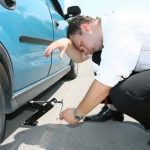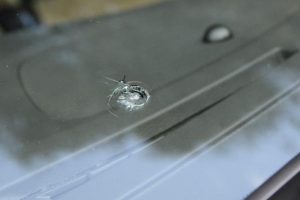Before we look at a few tips to help keep your car from breaking down, it’s important to realise that your car must be serviced as recommended by the manufacturer’s schedule. A regular service is the best way to keep your car in great shape, and will give your car a much lower chance of anything going wrong.
Apart from a regular service you can also carry out some routine checks of your own, which may not only prevent a breakdown, but could also get you out of a tight spot and put your car back on the road…
Check your tyres
Check your tyre pressures at least once every two weeks using either your own gauge or your local garage. Most petrol stations have really good machines that can test your pressure and also pump more air into them if needed.
Check your tyre pressures and tyre tread.Check the tread on your tyres as well as the general condition. Look out for any obvious visible signs of wear or if there are any cuts on the sidewalls. If you also notice that one of the tyres needs a regular top up of air, then it could mean a slow puncture and you need to get it looked at straight away.
To accurately check the tyre tread it’s important you buy a tyre depth gauge. They are really cheap and easy to find either on the internet or at your local garage. For more information on how to check your tyre tread, please click here for our simple guide.
Finally, have you got a spare tyre? If not, get one immediately as you never know when you might need it. If you do have a spare, then you also need to check the pressure as well, as this is just as important as checking the others.
Check your toolkit
Have you got a toolkit and do you know where it is? If not, check your handbook which should tell you where it’s usually stored. A basic toolkit should contain a jack and the tools to remove any of the wheels. If you don’t have a toolkit then it’s important you go out and get one as soon as possible.
 Once you have located the toolkit you should now familiarise yourself with the correct jacking points on your car, so you know exactly where to put the jack in case you have to change a tyre. Again, have a look in the manual to find out the correct points to place the jack.
Once you have located the toolkit you should now familiarise yourself with the correct jacking points on your car, so you know exactly where to put the jack in case you have to change a tyre. Again, have a look in the manual to find out the correct points to place the jack.
Finally, if you have alloy wheels which require a special wheel locking nut to take the wheels off, then make sure this is kept in a safe place along with your toolkit. Without this key you will not be able to remove the wheels.
Check your engine oil
To ensure you have enough oil check your dipstick at least once every two weeks, and especially before any lengthy journeys. For more information on checking your oil, please click here.
Make sure the oil and filter are changed every time you have your car serviced. A trusted garage should also use the correct oil as specified by the manufacturer.
If you car appears to be using a lot of oil then it could be a sign of engine problems. Don’t hesitate to mention this to your garage and have the car looked at.
Check your water
Regularly check the coolant level on the engine – but only when it’s cold. Also get the anti-freeze concentration checked before the winter months. As well as stopping your coolant freezing, anti-freeze prevents any build up of corrosion with the system itself, so it’s important you check this regularly.
Check your wipers
Worn wiper blades leave smears on your windscreen.If your wipers smear your windscreen with dirt and water rather than wipe it away, then this is a very good sign your wiper blades have worn and you need to replace them. If you drive your car during bad weather quite often, then ideally you should be changing your wiper blades about once a year.
Windscreens are especially hard to see out of during bright sunlight, and any smears could make it almost impossible to see through. Wipers are not very expensive, so it’s important to change them if you notice any wear or noticeable smears on your windscreen.
Check your screenwash
It’s actually a legal requirement to ensure your screenwash system is working, so make sure it’s topped up as often as possible. Don’t use water as this won’t be enough to clean away the dirt and grime from the roads. Water will also freeze in winter, so it’s important to buy proper screenwash.
Check your windscreen

You should regularly check your windscreen for any chips, as these can eventually turn into cracks and spread. Any chips or cracks could also impair the driver’s vision, so for safety reasons it’s important any windscreen damage is repaired immediately.
Windscreen specialists can repair any windscreen quickly and cheaply. Some insurance companies also offer this repair for free, so why not check your policy to see if you’ve been given this great little perk.
Check your lights
Your lights should be checked at least once a week. Make sure you check all of your lights including your indicators, fog lights and brake lights. It’s also important to make sure the covers on your lights are clean, so other motorists can see them clearly.
 If you find that water or dirt is collecting inside the cover, then you may need to get this replaced as there could be a crack. Book your car in at the garage to have this replaced, and in the meantime you could cover any small cracks with a bit of tape, taking care not to impair the light.
If you find that water or dirt is collecting inside the cover, then you may need to get this replaced as there could be a crack. Book your car in at the garage to have this replaced, and in the meantime you could cover any small cracks with a bit of tape, taking care not to impair the light.
Check your power steering
When you take your car in for a service, make sure you ask the garage to check the fluid reservoir. You can also check this yourself once a month to be safe, rather than wait for your yearly service.
If you need to top up the hydraulic fluid, check your handbook first to make sure you use the correct fluid. And if you have any doubts whatsoever, let the garage do it for you.
